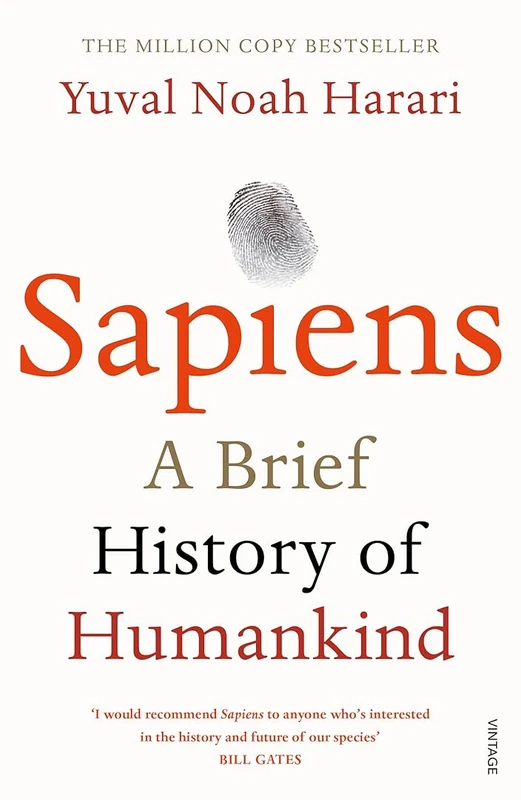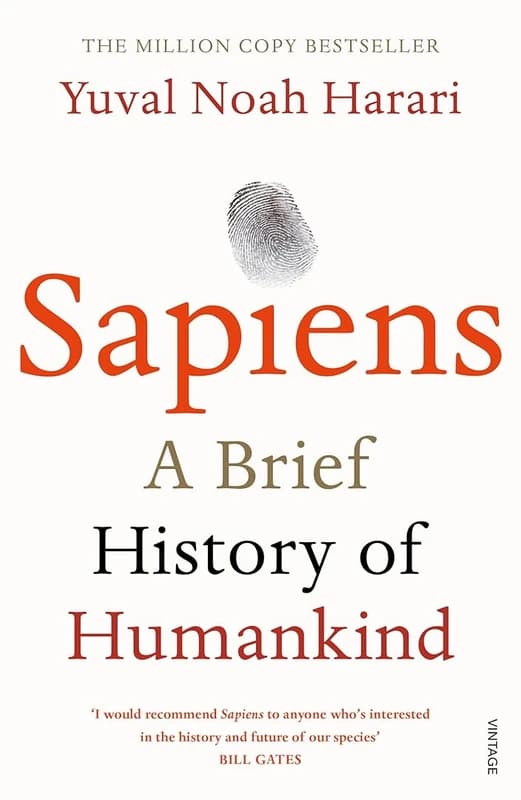Sapiens Book Summary & Analysis: Key Insights from Yuval Noah Harari’s Masterpiece

Sapiens Book Summary & Analysis: Key Insights from Yuval Noah Harari’s Masterpiece
by Arbind Singh
Sapiens Book Summary & Analysis: Key Insights from Yuval Noah Harari’s Masterpiece
Core Book Information
- Full Title & Subtitle: Sapiens: A Brief History of Humankind
- Author(s): Yuval Noah Harari. Harari is an Israeli public intellectual and historian, serving as a professor in the Department of History at the Hebrew University of Jerusalem. His background as a macro-historian specializing in world history provides the foundation for the book's sweeping, interdisciplinary approach.
- Publication Details: First published in Hebrew in 2011. The English edition was published in 2014 by Harvill Secker (UK) and in 2015 by Harper (US). The US hardcover edition is approximately 464 pages.
- Genre/Category: Primarily Big History and Popular Science. Secondarily, Anthropology and Philosophy.
- Target Audience: The intellectually curious general reader. The book is written to be highly accessible, requiring no prior expertise in history, biology, or anthropology.
Content Analysis
Central Thesis/Main Argument
Homo sapiens came to dominate the planet not because they were stronger or individually more intelligent than other human species, but because of their unique ability to cooperate flexibly in very large numbers. This cooperation is made possible by our capacity to create and believe in shared fictions or "imagined realities"—such as gods, nations, money, and human rights—which exist only in our collective imagination.
Key Themes & Concepts
- The Cognitive Revolution: Occurring roughly 70,000 years ago, this was the point where Homo sapiens developed new ways of thinking and communicating, primarily through a more sophisticated language. This allowed for the creation of abstract concepts, enabling the sharing of myths, which is the foundation for large-scale cooperation.
- Imagined Realities / Shared Myths: This is the book's central concept. Unlike other animals that can only describe objective reality, Sapiens can speak about things that do not physically exist. These fictions, when believed by millions, become powerful forces that shape society (e.g., a corporation like Peugeot is a legal fiction, yet it employs thousands and builds cars).
- The Agricultural Revolution as "History's Biggest Fraud": Harari provocatively argues that the shift from foraging to farming, while enabling massive population growth, led to a far worse quality of life for the average individual. Farmers worked harder, had a less varied and nutritious diet, and were more susceptible to disease and famine than their hunter-gatherer ancestors. In a sense, "it wasn't we who domesticated wheat, but wheat that domesticated us."
- The Unification of Humankind: Over millennia, humanity has trended towards unification. Harari identifies three universal orders that transcended local cultures and brought people together under a single umbrella:
- Money: A system of mutual trust that allows strangers to cooperate on trade.
- Empires: Political orders that govern vast, diverse populations.
- Universal Religions: Belief systems (like Christianity, Islam, and Buddhism) that claim to be true for all people, everywhere.
- The Scientific Revolution and the Admission of Ignorance: Beginning around 1500, the Scientific Revolution was sparked by a willingness to admit ignorance ("we don't know"). This pursuit of new knowledge, combined with the ideologies of capitalism and imperialism, fueled an unprecedented explosion of human power and technological advancement.
- The Question of Happiness: A recurring theme is whether the immense increase in collective human power has translated into an increase in individual happiness. Harari is skeptical, suggesting that a hunter-gatherer may have been more content than a modern office worker, and challenges the reader to consider what we have lost in our quest for progress.
Structure & Organization
The book follows a clear chronological and thematic structure, divided into four major parts that correspond to key historical revolutions:
- Part One: The Cognitive Revolution: Traces the rise of Homo sapiens and their development of language and myth, leading to their spread across the globe and the extinction of other human species.
- Part Two: The Agricultural Revolution: Explores the shift to farming and its profound consequences for human society, health, and social structures.
- Part Three: The Unification of Humankind: Discusses the development of money, empires, and religion as forces that created an increasingly interconnected global culture.
- Part Four: The Scientific Revolution: Details the explosion of knowledge and power over the last 500 years and reflects on the future of humankind, including our potential to become god-like creators of new life forms.
Critical Arguments/Evidence
Harari synthesizes evidence from a vast array of fields—history, biology, archaeology, and economics—to support his macro-narrative. His arguments are less about presenting new data and more about weaving existing knowledge into a compelling, novel framework. For example, he uses the legal structure of the Peugeot corporation to brilliantly illustrate the tangible power of a purely "imagined reality."
Practical Value
Key Takeaways
- Human society is built on stories. Recognizing this allows one to critically assess the "naturalness" of our current political, economic, and social orders.
- The concept of linear "progress" is a myth. Major historical shifts, like the Agricultural Revolution, had significant downsides for individual well-being.
- Money is the most successful story ever told—a system of trust that allows for universal cooperation between strangers.
- The partnership between science, capitalism, and empire has been the primary engine of the modern world.
- Our immense collective power has not necessarily translated into greater individual happiness.
- Homo sapiens may be nearing the end of their story, as biotechnology and AI could lead to the creation of a new, fundamentally different kind of being.
Applications
While not a practical "how-to" book, Sapiens provides a powerful mental model for understanding the world. It is applicable in fields like:
- Sociology and Politics: For understanding how social constructs shape society.
- Economics: For appreciating that economic systems are built on a foundation of collective belief and trust.
- Marketing and Business: For recognizing the power of storytelling and brand myths in shaping consumer behavior.
- Personal Philosophy: For encouraging readers to question their own assumptions about life, happiness, and purpose.
Unique Contributions
Sapiens' unique contribution is its breathtaking scope and its masterful synthesis of multiple disciplines into a single, accessible narrative. It pioneered the modern "Big History" genre for a mass audience, making academic concepts feel like an epic story. Its provocative, often contrarian style forces readers to reconsider everything they thought they knew about human history.
Critical Evaluation
Strengths
- Brilliantly Written and Engaging: Harari is a master storyteller, turning complex history into a page-turning narrative.
- Incredibly Ambitious Synthesis: The book connects seemingly disparate fields in novel and insightful ways.
- Thought-Provoking: It challenges conventional wisdom and forces readers to think from a first-principles perspective.
- Highly Accessible: Complicated ideas are explained with clarity and relatable examples.
Limitations
- Over-Generalization: To cover 70,000 years of history in one volume requires massive generalizations. Specialists in specific eras or fields have criticized Harari for glossing over nuances and complexities.
- Potential for Determinism: The narrative can sometimes feel deterministic, as if humanity was on an inevitable path, downplaying the role of contingency and individual agency.
- Provocative Claims as Fact: Some of Harari's most provocative arguments (like the "biggest fraud" claim) are presented with a high degree of certainty, though they are debated among experts.
Relevance & Impact
The book's impact has been immense. It became a global phenomenon, read by millions and recommended by figures like Bill Gates, Mark Zuckerberg, and Barack Obama. It has fundamentally shaped public discourse on history, progress, and the future of humanity, spawning two sequels (Homo Deus and 21 Lessons for the 21st Century) and cementing Harari's status as a leading public intellectual.
Comparison Context
- Guns, Germs, and Steel by Jared Diamond: The spiritual predecessor to Sapiens in the "Big History" genre. Diamond argues that geographic and environmental factors were the primary drivers of historical inequality. Harari complements this by focusing on the cognitive and cultural factors—the stories we tell ourselves.
- The Dawn of Everything by David Graeber & David Wengrow: This book is, in many ways, a direct scholarly rebuttal to the grand, linear narratives of books like Sapiens. It argues that early human societies were far more diverse, experimental, and politically self-conscious than Harari's narrative suggests.
- Homo Deus: A Brief History of Tomorrow by Yuval Noah Harari: Harari's own sequel. Where Sapiens looks at the past to explain the present, Homo Deus looks at the present to speculate about the future, exploring how humanity's quest for immortality, happiness, and divinity might end the era of Homo sapiens.
Reader Recommendations
This book is highly recommended for:
- The intellectually curious general reader who wants a "big picture" view of human history.
- Students of history, sociology, anthropology, and philosophy as a compelling introduction to macro-level thinking.
- Anyone feeling siloed in their own field who wants to understand how their work fits into the grand sweep of human endeavor.
- People who enjoy challenging, thought-provoking non-fiction that questions fundamental assumptions about society and progress.
Homo sapiens came to dominate the planet not because they were stronger or individually more intelligent than other human species, but because of their unique ability to cooperate flexibly in very large numbers. This cooperation is made possible by our capacity to create and believe in shared fictions or "imagined realities"—such as gods, nations, money, and human rights—which exist only in our collective imagination.

